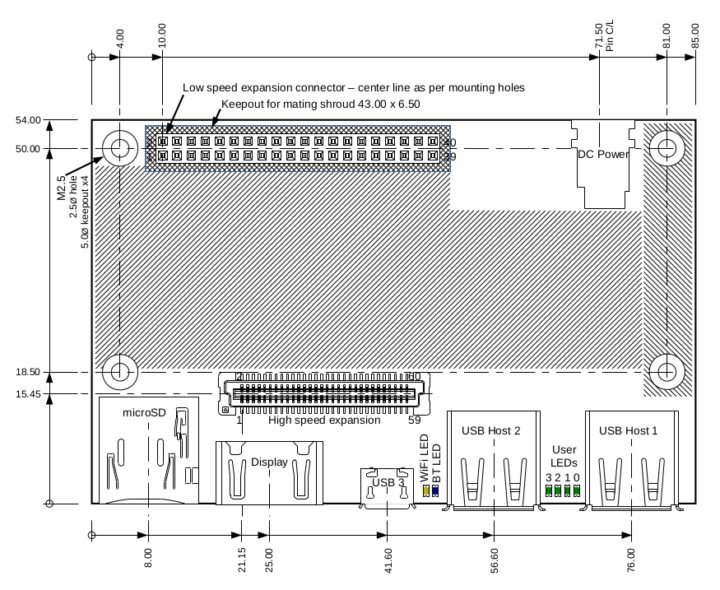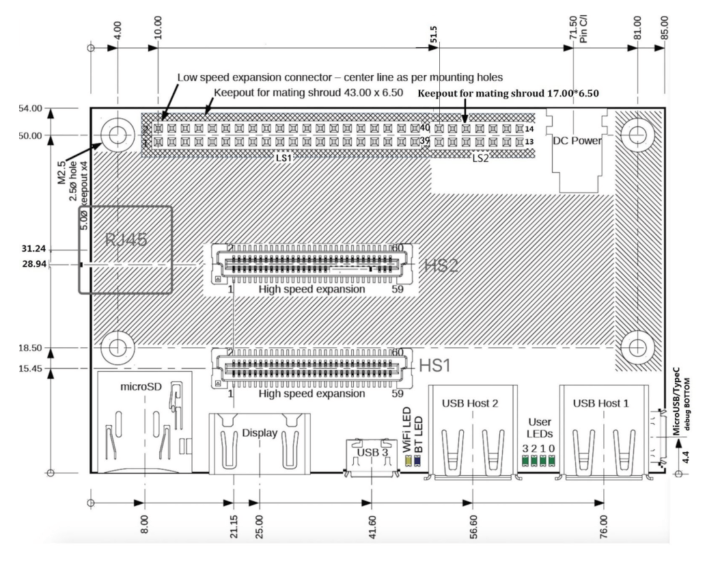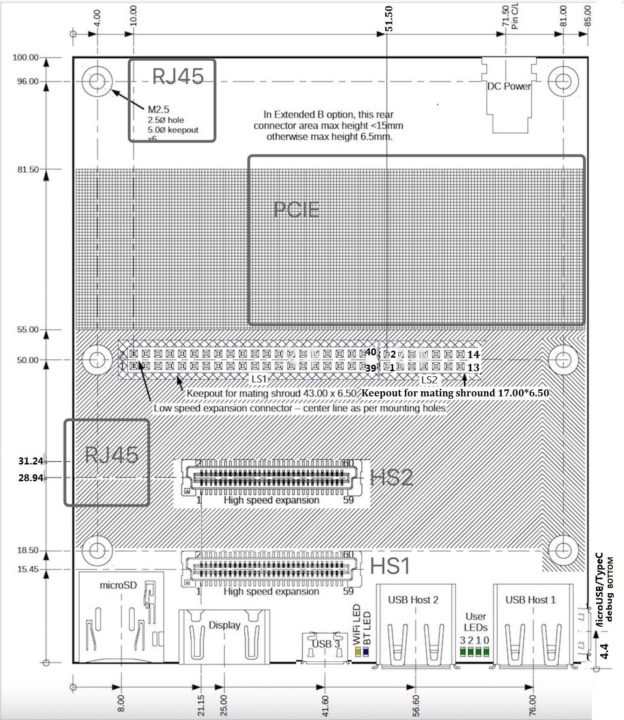Linaro’s 96Boards specification was first introduced in 2015 with the launch of Hikey SBC following 96Boards CE specification, which CE standing for Consumer Edition.
The standard would define mechanical, electrical, and software requirements to create an ecosystem of low-cost, expandable, compatible, and well-supported boards. The software requirements were never very well followed, and while the hardware would usually be compliant, some complained about the specifications themselves notably with the lack of Ethernet for the standard version of the 96Boards CE SBC.

Linaro has now announced the updated 96Boards CE specification 2.0 that adds ports location for optional Ethernet and PCIe Ethernet connector among other things.
The minimum hardware requirements remain the mostly same, except for a few tweaks:
- Ultra-small low-profile form factor – 85x54x12 mm
- Extended Version: 85x100x12mm
- Design is SoC independent (targets 32- and 64-bit SoCs)
- 0.5 GB RAM (Minimum 4GB recommended for Android)
- MicroSDHC Socket for up 64GB onboard or expansion flash storage
- Wi-Fi 802.11g/n and Bluetooth 4.0 LE
- On-board connectors and expansion I/O:
- 2x USB Type-A or Type-C host ports (USB 2.x or 3.x)
- USB
Micro-B USB ortype C slaveor OTG port(USB 2.x or USB 3.x) for PC connection - Display Output: HDMI/audio, or MHL/audio (micro USB), or DisplayPort/MHL/audio (USB type C)
- Low profile 40-way female header for maker/community use
- Low profile 60-way high-speed female module header for advanced maker/OEM use with high-speed interfaces including MIPI-DSI, USB, and optional MIPI CSI-2
- Board power from low profile DC jack connector
The minimum memory requirement for Android support has been bumped from 1GB to 4GB, and the MicroUSB port is not allowed for PC connection, relying on USB Type-C only.

But the more interesting are optional features like an extra RJ45 (Ethernet) port that was only available in the Extended Version of the previous specs, a new high-speed HS2 expansion connector with 2x PCIe, 1x USB 3.0, 2x CSI-2 ( x4 Lanes optional) and SPI, as well as a new 14-pin low-speed LS2 expansion connector with 5V/GND and audio signals, namely MIC/Speaker/Headset.

The Extension Version of the specifications has also been updated. Previously the extended part of the board pretty much “do whatever you want” except for the location of the DC jack, but now 96Boards CE specs v2.0 define the location of the mandatory Ethernet port, and the optional M.2 or mini PCIe socket with PCIe signals.
The first two boards compliant with 96Boards CE v2.0 will be developer and manufactured by Beiqi Cloud with namely TB-96AIoT-1126CE Rockchip RV1126 SBC and TB-96AI-3568-CE RK3568 development board. There are few details at this time, but once the board are released in May, we’ll make sure to feature them on CNX Software.
You can find more details in the announcement, or check out 96boards CE V2.0 specs on Linaro website.

Jean-Luc started CNX Software in 2010 as a part-time endeavor, before quitting his job as a software engineering manager, and starting to write daily news, and reviews full time later in 2011.
Support CNX Software! Donate via cryptocurrencies, become a Patron on Patreon, or purchase goods on Amazon or Aliexpress





missed chance. highly doubt this will aid in 96boards lacklustre adoption.
96boards advantage over the rpi form factor has always been that all ports are on the same (long) side. so far it has been missing rj45. now, they add it in a position where no one wants it.
as it is, it would have been better to just add a pin header for rj45… it would have been infinitely better swapping it with the mSD position. *facepalm*
For me from the beginning the 96boards form factor was condemned by the lack of RJ45. I have no idea how someone there imagined that a form factor would become the standard in the 21th century without network connectivity, probably that they imagined that these boards would be used in smartphones with their USB connectors? Worse, developers need to work on the final version of a board, and being able to boot images over TFTP 100 times a day during development is crucial. This form factor makes all this painful or requires to use a different board during development and… Read more »